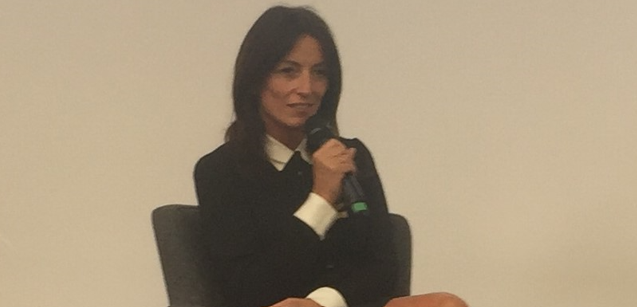Davina McCall has urged employers to open-up conversations and fill the “void” around menopause in the workplace.
The TV presenter told of her own problems within the television industry as she supported Wellbeing of Women’s first conference and its menopause workplace pledge.
Dame Lesley Regan, chairwoman of the charity which is dedicated to funding research across all of women’s reproductive and gynaecological health said organisations could start engaging their own people by signing the pledge.
Regan, who is also the government’s Women’s Health Ambassador, was speaking at the charity’s first summit in London yesterday supported by WPA.
Sharing the platform was Davina McCall, (pictured) who filmed a Channel 4 documentary about her own experiences with perimenopause in the spring.
McCall told delegates that she first started talking about menopause on her fitness platform.
But it was following a chat with specialist Dr Louise Newson that she realised she did not know about menopause health issues, and it appeared a lot of other people did not either.
She revealed it was then that she logged onto Twitter and started asking people some questions.
Menopause taboo in the workplace
“I hadn’t talked about my menopause. We are scared that we’re not relevant anymore, that we become invisible, that we can’t talk about it in the workplace,” said McCall.
“When I was 40, I honestly thought that TV would have spat me out by the time I was 50 because I was perimenopausal and passed my sell by date.
“I felt that when it did start happening to me that I didn’t know what it was. I didn’t even know it was perimenopause. If I had I known it was perimenopause, I would have decided that my career was over.”
McCall added that her condition stopped her from being able to work but after visiting a gynaecologist, was given hormone replacement therapy (HRT) and her life changed.
But she also remembered a period where she experienced an overriding feeling of isolation.
“I did not even talk to my friends,” she continued.
“Some of my friends were naturopaths and homeopaths and they were anti everything and all my other friends were like: ‘you don’t look like you’re going through it’. I had no-one to talk to. I felt so isolated.”
The void is filling
After speaking to a couple of websites where other women expressed their concerns about their own conditions, McCall revealed she was approached by journalist Kate Muir about doing the documentary which she noted that changed her life.
“I talked about something that was going to be career ending or it was going to help a few people,” McCall said.
“I had no concept, none at the time, that it was going to change my life in such a wonderful way. It has given me such a purpose. I can’t even begin to tell you to be able to talk to people.
“The next day on my dog walk, it took me two hours on an hour-long dog walk because everybody kept stopping me, men and women. I was thinking, what the hell is going on?
“And that is because there is a void. Well, there was a void of people talking about it and I do believe that void is filling, and voices are coming forward.”
Sign up to the pledge
And when asked by Health & Protection about what employers can do to facilitate conversations about menopause between line managers and their teams, Regan’s response was clear.
“Go on to the Wellbeing of Women website and sign your company up or signpost others you know to go and sign the menopause workplace pledge,” she said.
“It’s not an onerous pledge but it means you are committing to accessing information, providing a space where women can ask for information and be given it.”






